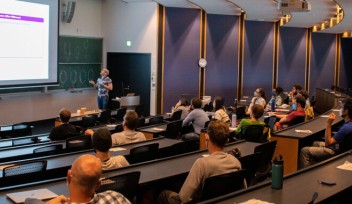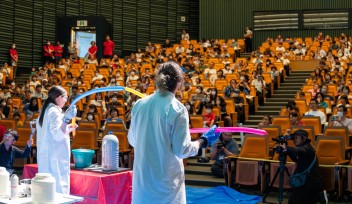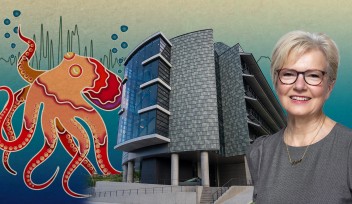Japan Scicom Forum 2023 held at OIST

Long ago, the historical Ryukyu Kingdom of Okinawa was a center of trade in the region, a conflux of people and ideas. Okinawans travelled to Japan, China, Thailand, the Philippines, and many other places to exchange goods and ideas, which has left its mark on modern-day Okinawa and its unique and open-minded culture. In a way, then, locating the fifth annual Japan Scicom Forum (JSF) at the Okinawa Institute for Science and Technology (OIST) has a historical antecedent, and it was itself a historical moment for JSF, bringing together participants, speakers and organizers from across Japan, Southeast Asia, and as far as the UK and Nigeria.
As the previous two iterations of the JSF conferences were held online due to COVID-19, coupled with how most English-speaking science communicators in Japan are few and far between, finally being able to convene in-person has been a relief for many. Enthusiasm was felt throughout the conference, but especially in the coffee breaks and the networking dinner: people were excited to connect in-person, and business cards and experiences were exchanged over coffee, cookies, and canapés.

Networking was clearly a key feature of this year’s JSF, as participants came together from all walks of professional life to bond over communications across institutions, media forms and backgrounds. Ali Bailey, director of communications at The Francis Crick Institute (The Crick), the keynote speaker, told the atypical tale of how she came to The Crick, with a background in biology, through producing radio for the BBC, to directing communications for British hospitals and finally The Crick. A similar theme arose in the panel discussion, which was moderated by the Vice President of Communications at OIST, Heather Young, about the multifaceted world of science communicators, where the diverse group of panelists from Japan, Nigeria and the Philippines shared their stories of personal and professional development, from STEM to Comms, Africa to Japan, and global climate efforts to local medical care.

JSF23 was also a gold mine of concrete skills, with four workshops giving participants a way to grapple with different tools such as podcasting and animation and improving cultural awareness in translating science from global to local, Japanese to English, and vice versa. The six flash talks provided six sparks of inspiration for rethinking the boundaries of our creative toolboxes in communicating science and engaging with popular audiences, whether it’s using comprehensive data analysis to assess the needs of a given community, setting up STEM escape rooms or leveraging creative writing.

The organizers, volunteers, and OIST hosts all came together to make the JSF23 conference a resounding success. The drive to improve the field of science communication, and the desire to create an open yet warm, productive yet casual space for English-speaking science communicators across Japan and beyond, was inspiring to witness, and promises a bright future for the dissemination of science ahead.
To see all the photos from JSF23, please see the Flickr album here.
For press enquiries:
Press Inquiry Form














